Business Law Report: Consumer Protection and Intellectual Property
VerifiedAdded on 2020/02/17
|21
|7282
|438
Report
AI Summary
This report delves into various aspects of business law, providing an overview of legal rules related to the sale of goods and supply of services, including implied terms, statutory provisions, and product liability. It examines the legal rules concerning the transfer of property and possession, buyer's and seller's remedies, and the application of these principles in case scenarios. The report also explores different types of credit agreements, the roles and responsibilities of agents, and the regulations surrounding monopolies and anti-competitive practices. Furthermore, it covers the differing forms of intellectual property, including patents, trademarks, and copyright, and analyzes principles relating to the protection of inventions and copyright infringement. The report concludes with a comprehensive analysis of the legal framework governing business operations and consumer protection.
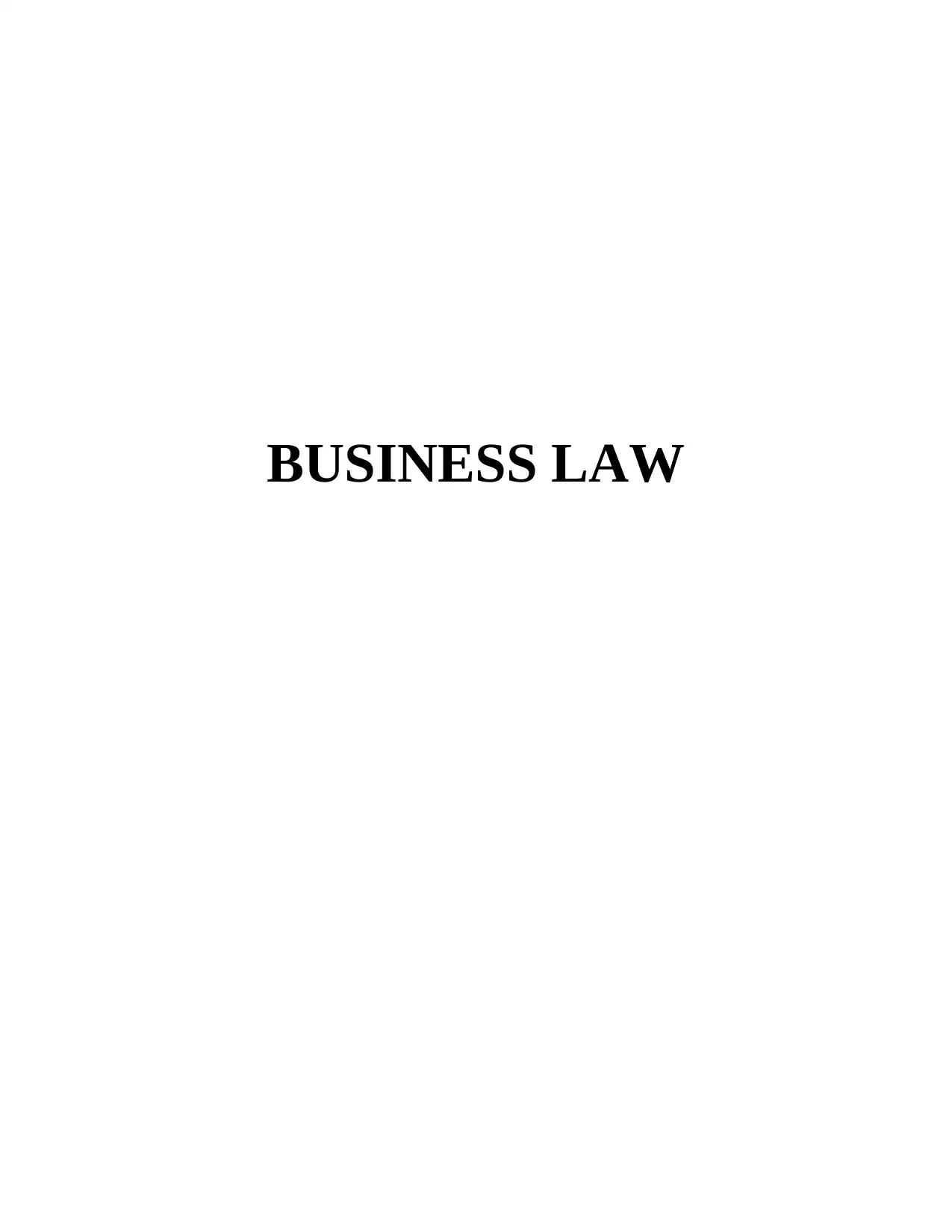
BUSINESS LAW
Paraphrase This Document
Need a fresh take? Get an instant paraphrase of this document with our AI Paraphraser
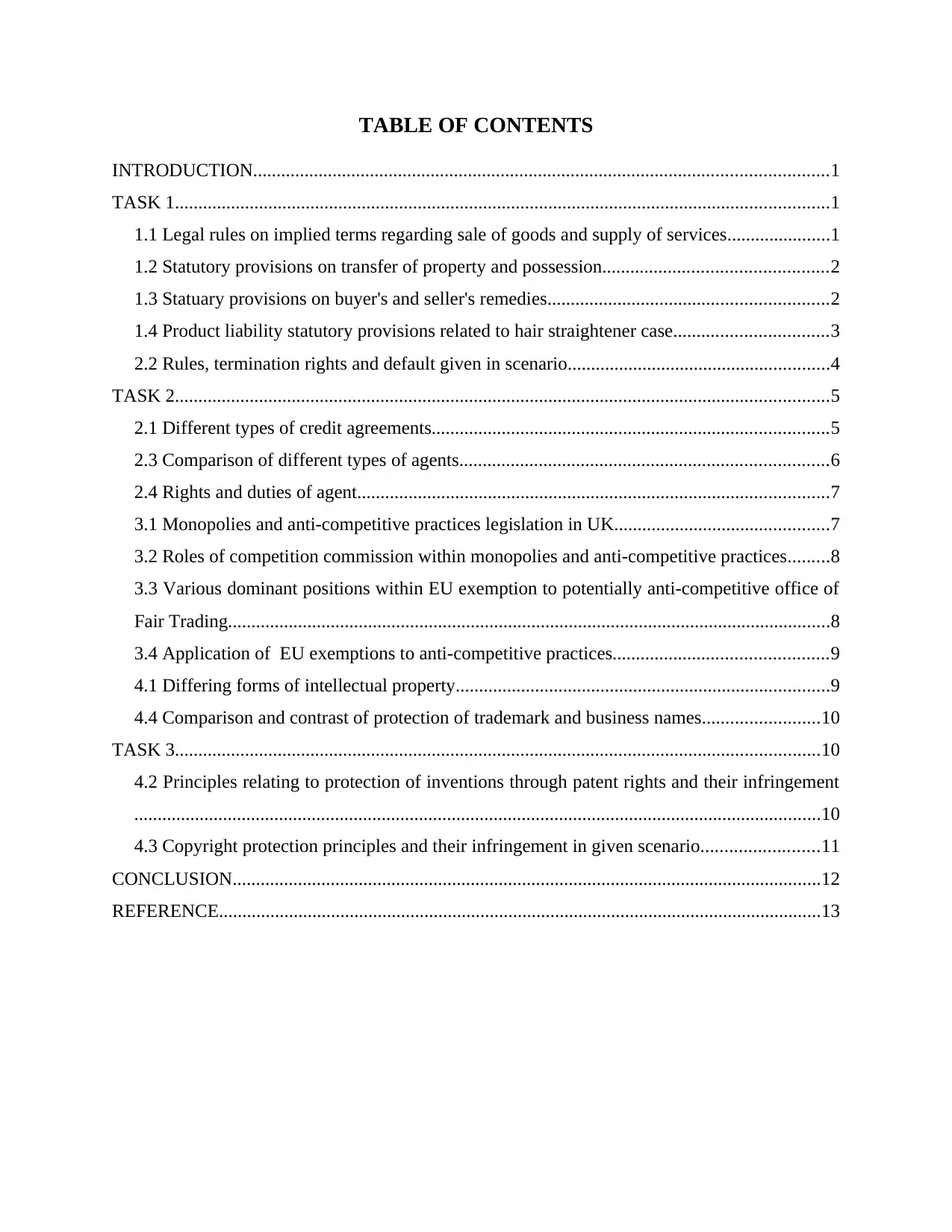
TABLE OF CONTENTS
INTRODUCTION...........................................................................................................................1
TASK 1............................................................................................................................................1
1.1 Legal rules on implied terms regarding sale of goods and supply of services......................1
1.2 Statutory provisions on transfer of property and possession................................................2
1.3 Statuary provisions on buyer's and seller's remedies............................................................2
1.4 Product liability statutory provisions related to hair straightener case.................................3
2.2 Rules, termination rights and default given in scenario........................................................4
TASK 2............................................................................................................................................5
2.1 Different types of credit agreements.....................................................................................5
2.3 Comparison of different types of agents...............................................................................6
2.4 Rights and duties of agent.....................................................................................................7
3.1 Monopolies and anti-competitive practices legislation in UK..............................................7
3.2 Roles of competition commission within monopolies and anti-competitive practices.........8
3.3 Various dominant positions within EU exemption to potentially anti-competitive office of
Fair Trading.................................................................................................................................8
3.4 Application of EU exemptions to anti-competitive practices..............................................9
4.1 Differing forms of intellectual property................................................................................9
4.4 Comparison and contrast of protection of trademark and business names.........................10
TASK 3..........................................................................................................................................10
4.2 Principles relating to protection of inventions through patent rights and their infringement
...................................................................................................................................................10
4.3 Copyright protection principles and their infringement in given scenario.........................11
CONCLUSION..............................................................................................................................12
REFERENCE.................................................................................................................................13
INTRODUCTION...........................................................................................................................1
TASK 1............................................................................................................................................1
1.1 Legal rules on implied terms regarding sale of goods and supply of services......................1
1.2 Statutory provisions on transfer of property and possession................................................2
1.3 Statuary provisions on buyer's and seller's remedies............................................................2
1.4 Product liability statutory provisions related to hair straightener case.................................3
2.2 Rules, termination rights and default given in scenario........................................................4
TASK 2............................................................................................................................................5
2.1 Different types of credit agreements.....................................................................................5
2.3 Comparison of different types of agents...............................................................................6
2.4 Rights and duties of agent.....................................................................................................7
3.1 Monopolies and anti-competitive practices legislation in UK..............................................7
3.2 Roles of competition commission within monopolies and anti-competitive practices.........8
3.3 Various dominant positions within EU exemption to potentially anti-competitive office of
Fair Trading.................................................................................................................................8
3.4 Application of EU exemptions to anti-competitive practices..............................................9
4.1 Differing forms of intellectual property................................................................................9
4.4 Comparison and contrast of protection of trademark and business names.........................10
TASK 3..........................................................................................................................................10
4.2 Principles relating to protection of inventions through patent rights and their infringement
...................................................................................................................................................10
4.3 Copyright protection principles and their infringement in given scenario.........................11
CONCLUSION..............................................................................................................................12
REFERENCE.................................................................................................................................13
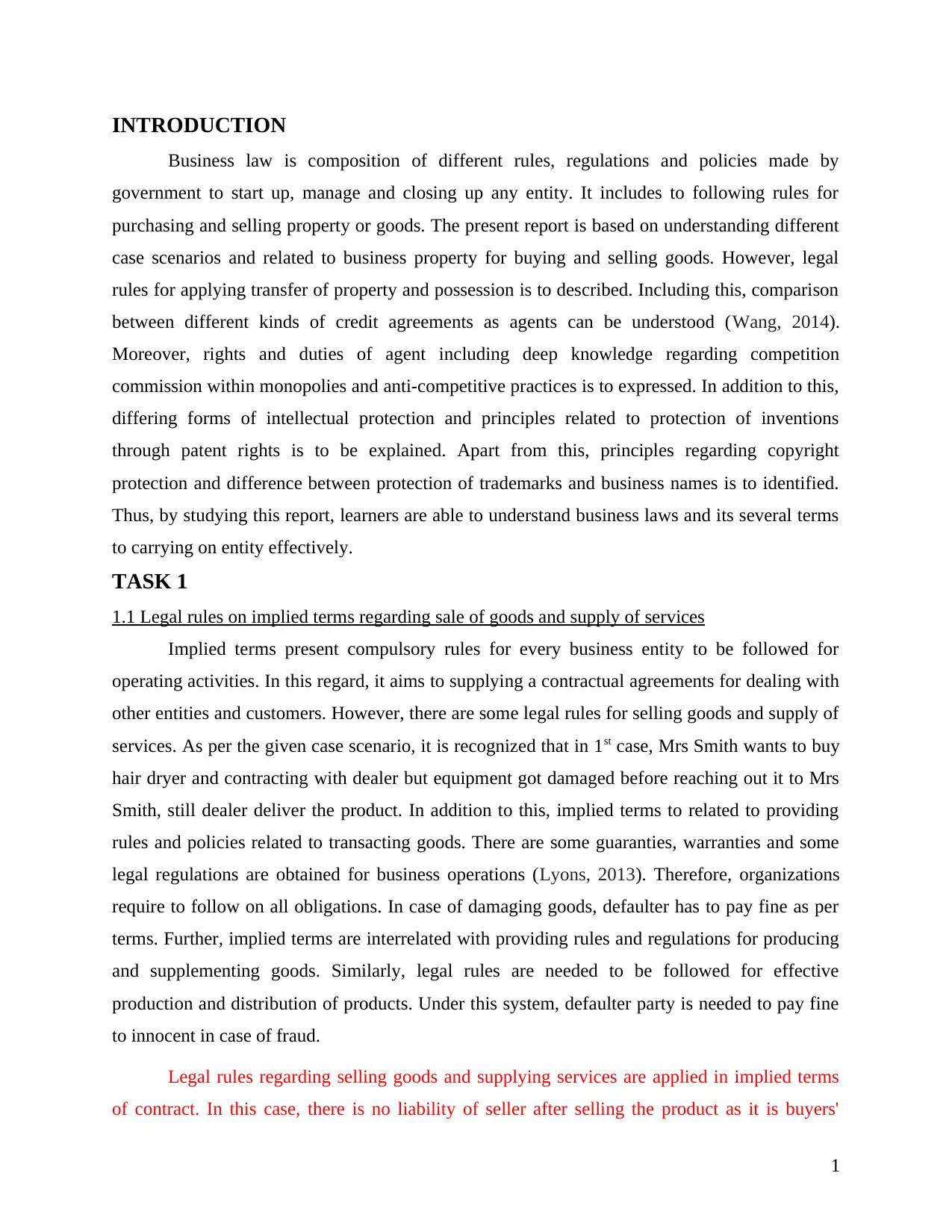
INTRODUCTION
Business law is composition of different rules, regulations and policies made by
government to start up, manage and closing up any entity. It includes to following rules for
purchasing and selling property or goods. The present report is based on understanding different
case scenarios and related to business property for buying and selling goods. However, legal
rules for applying transfer of property and possession is to described. Including this, comparison
between different kinds of credit agreements as agents can be understood (Wang, 2014).
Moreover, rights and duties of agent including deep knowledge regarding competition
commission within monopolies and anti-competitive practices is to expressed. In addition to this,
differing forms of intellectual protection and principles related to protection of inventions
through patent rights is to be explained. Apart from this, principles regarding copyright
protection and difference between protection of trademarks and business names is to identified.
Thus, by studying this report, learners are able to understand business laws and its several terms
to carrying on entity effectively.
TASK 1
1.1 Legal rules on implied terms regarding sale of goods and supply of services
Implied terms present compulsory rules for every business entity to be followed for
operating activities. In this regard, it aims to supplying a contractual agreements for dealing with
other entities and customers. However, there are some legal rules for selling goods and supply of
services. As per the given case scenario, it is recognized that in 1st case, Mrs Smith wants to buy
hair dryer and contracting with dealer but equipment got damaged before reaching out it to Mrs
Smith, still dealer deliver the product. In addition to this, implied terms to related to providing
rules and policies related to transacting goods. There are some guaranties, warranties and some
legal regulations are obtained for business operations (Lyons, 2013). Therefore, organizations
require to follow on all obligations. In case of damaging goods, defaulter has to pay fine as per
terms. Further, implied terms are interrelated with providing rules and regulations for producing
and supplementing goods. Similarly, legal rules are needed to be followed for effective
production and distribution of products. Under this system, defaulter party is needed to pay fine
to innocent in case of fraud.
Legal rules regarding selling goods and supplying services are applied in implied terms
of contract. In this case, there is no liability of seller after selling the product as it is buyers'
1
Business law is composition of different rules, regulations and policies made by
government to start up, manage and closing up any entity. It includes to following rules for
purchasing and selling property or goods. The present report is based on understanding different
case scenarios and related to business property for buying and selling goods. However, legal
rules for applying transfer of property and possession is to described. Including this, comparison
between different kinds of credit agreements as agents can be understood (Wang, 2014).
Moreover, rights and duties of agent including deep knowledge regarding competition
commission within monopolies and anti-competitive practices is to expressed. In addition to this,
differing forms of intellectual protection and principles related to protection of inventions
through patent rights is to be explained. Apart from this, principles regarding copyright
protection and difference between protection of trademarks and business names is to identified.
Thus, by studying this report, learners are able to understand business laws and its several terms
to carrying on entity effectively.
TASK 1
1.1 Legal rules on implied terms regarding sale of goods and supply of services
Implied terms present compulsory rules for every business entity to be followed for
operating activities. In this regard, it aims to supplying a contractual agreements for dealing with
other entities and customers. However, there are some legal rules for selling goods and supply of
services. As per the given case scenario, it is recognized that in 1st case, Mrs Smith wants to buy
hair dryer and contracting with dealer but equipment got damaged before reaching out it to Mrs
Smith, still dealer deliver the product. In addition to this, implied terms to related to providing
rules and policies related to transacting goods. There are some guaranties, warranties and some
legal regulations are obtained for business operations (Lyons, 2013). Therefore, organizations
require to follow on all obligations. In case of damaging goods, defaulter has to pay fine as per
terms. Further, implied terms are interrelated with providing rules and regulations for producing
and supplementing goods. Similarly, legal rules are needed to be followed for effective
production and distribution of products. Under this system, defaulter party is needed to pay fine
to innocent in case of fraud.
Legal rules regarding selling goods and supplying services are applied in implied terms
of contract. In this case, there is no liability of seller after selling the product as it is buyers'
1
⊘ This is a preview!⊘
Do you want full access?
Subscribe today to unlock all pages.

Trusted by 1+ million students worldwide

responsibility to looking the goods and entering into agreement carefully. In this regard, as per
given case scenario, it is Mrs. Smith responsibility to checking out hair dryer before payment and
purchasing the product (Katsos and Forrer, 2014). Therefore, through implied terms of any
contract, there is no liability of seller to pay fine after selling the goods in case of damaging.
Thus, for selling goods and supplying services, seller is not liable to refund on default products.
Legal rules on implied terms regarding sale of goods and supply of services can
understand through following rules and regulations of Section 12 as:
Section (12):
When seller sales the goods, then property and possession over things also get passed.
Before entering into the contract, goods are free to sold out and exchanging its
ownership.
Section (13):
Selling goods in sample should be with presenting its description related to quality
features of goods.
Only description is not enough, there is requirement to concise of the stated presentation.
Section (14):
It is required to satisfy quality of goods with its presented descriptions.
There should not be any defects in goods which are to sold out (Katsos and Forrer, 2014).
All legal systems are implemented in the country for protecting frauds and providing rights to
favourable party. In this regard, it is able for effective business operations as selling and
purchasing items for its effectiveness. Therefore, legal systems are efficient for effective
business operations and reducing frauds.
1.2 Statutory provisions on transfer of property and possession
Rules of legal policy for related to transformation and possession of goods are followed
on that provides information and different cases. In this regard, statutory provisions are related to
providing more information about business operations and protecting customers from damage.
Under statutory provision, it is stated that in case of damage, owner is liable to pay fine as per
terms and conditions. However, different kinds of information and regulations are obtained to
2
given case scenario, it is Mrs. Smith responsibility to checking out hair dryer before payment and
purchasing the product (Katsos and Forrer, 2014). Therefore, through implied terms of any
contract, there is no liability of seller to pay fine after selling the goods in case of damaging.
Thus, for selling goods and supplying services, seller is not liable to refund on default products.
Legal rules on implied terms regarding sale of goods and supply of services can
understand through following rules and regulations of Section 12 as:
Section (12):
When seller sales the goods, then property and possession over things also get passed.
Before entering into the contract, goods are free to sold out and exchanging its
ownership.
Section (13):
Selling goods in sample should be with presenting its description related to quality
features of goods.
Only description is not enough, there is requirement to concise of the stated presentation.
Section (14):
It is required to satisfy quality of goods with its presented descriptions.
There should not be any defects in goods which are to sold out (Katsos and Forrer, 2014).
All legal systems are implemented in the country for protecting frauds and providing rights to
favourable party. In this regard, it is able for effective business operations as selling and
purchasing items for its effectiveness. Therefore, legal systems are efficient for effective
business operations and reducing frauds.
1.2 Statutory provisions on transfer of property and possession
Rules of legal policy for related to transformation and possession of goods are followed
on that provides information and different cases. In this regard, statutory provisions are related to
providing more information about business operations and protecting customers from damage.
Under statutory provision, it is stated that in case of damage, owner is liable to pay fine as per
terms and conditions. However, different kinds of information and regulations are obtained to
2
Paraphrase This Document
Need a fresh take? Get an instant paraphrase of this document with our AI Paraphraser
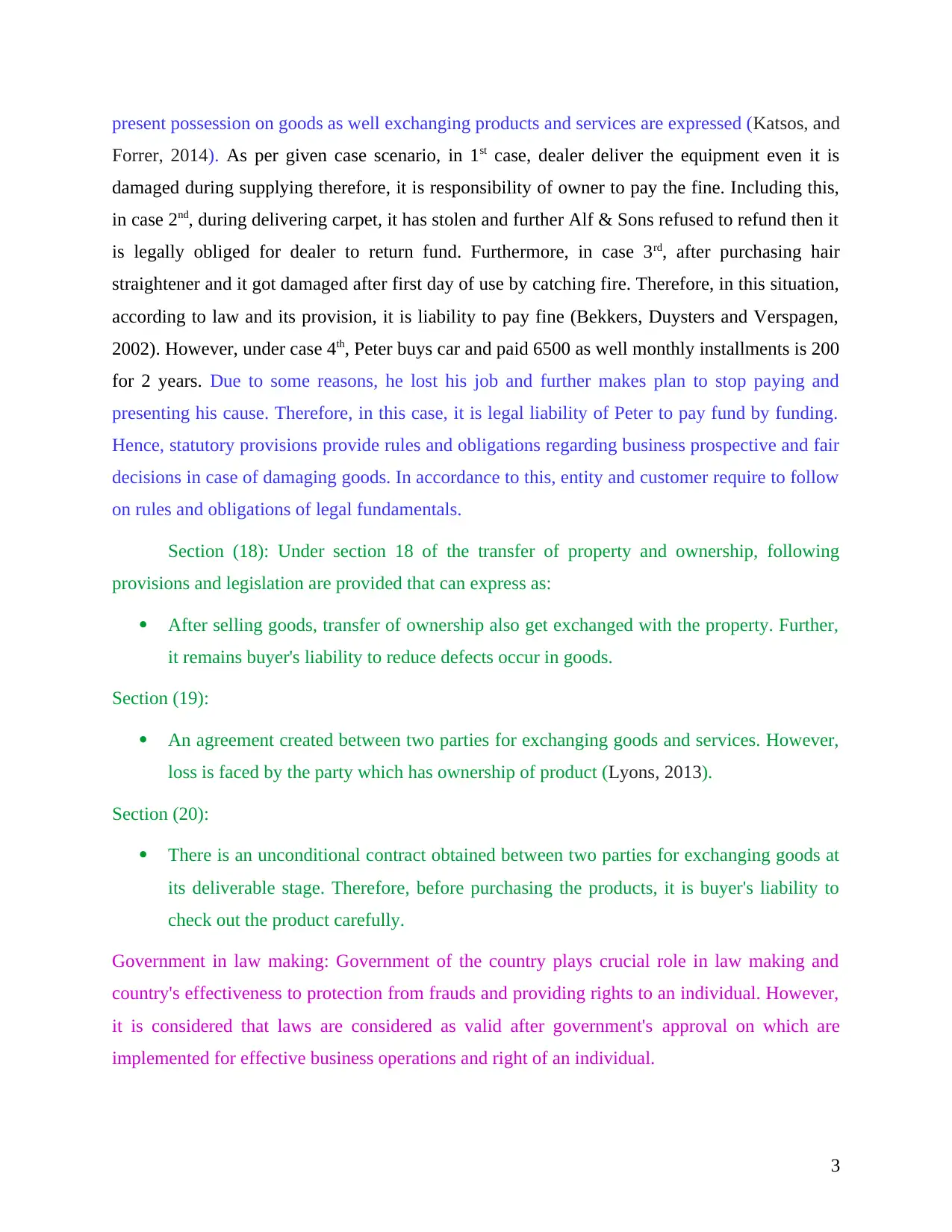
present possession on goods as well exchanging products and services are expressed (Katsos, and
Forrer, 2014). As per given case scenario, in 1st case, dealer deliver the equipment even it is
damaged during supplying therefore, it is responsibility of owner to pay the fine. Including this,
in case 2nd, during delivering carpet, it has stolen and further Alf & Sons refused to refund then it
is legally obliged for dealer to return fund. Furthermore, in case 3rd, after purchasing hair
straightener and it got damaged after first day of use by catching fire. Therefore, in this situation,
according to law and its provision, it is liability to pay fine (Bekkers, Duysters and Verspagen,
2002). However, under case 4th, Peter buys car and paid 6500 as well monthly installments is 200
for 2 years. Due to some reasons, he lost his job and further makes plan to stop paying and
presenting his cause. Therefore, in this case, it is legal liability of Peter to pay fund by funding.
Hence, statutory provisions provide rules and obligations regarding business prospective and fair
decisions in case of damaging goods. In accordance to this, entity and customer require to follow
on rules and obligations of legal fundamentals.
Section (18): Under section 18 of the transfer of property and ownership, following
provisions and legislation are provided that can express as:
After selling goods, transfer of ownership also get exchanged with the property. Further,
it remains buyer's liability to reduce defects occur in goods.
Section (19):
An agreement created between two parties for exchanging goods and services. However,
loss is faced by the party which has ownership of product (Lyons, 2013).
Section (20):
There is an unconditional contract obtained between two parties for exchanging goods at
its deliverable stage. Therefore, before purchasing the products, it is buyer's liability to
check out the product carefully.
Government in law making: Government of the country plays crucial role in law making and
country's effectiveness to protection from frauds and providing rights to an individual. However,
it is considered that laws are considered as valid after government's approval on which are
implemented for effective business operations and right of an individual.
3
Forrer, 2014). As per given case scenario, in 1st case, dealer deliver the equipment even it is
damaged during supplying therefore, it is responsibility of owner to pay the fine. Including this,
in case 2nd, during delivering carpet, it has stolen and further Alf & Sons refused to refund then it
is legally obliged for dealer to return fund. Furthermore, in case 3rd, after purchasing hair
straightener and it got damaged after first day of use by catching fire. Therefore, in this situation,
according to law and its provision, it is liability to pay fine (Bekkers, Duysters and Verspagen,
2002). However, under case 4th, Peter buys car and paid 6500 as well monthly installments is 200
for 2 years. Due to some reasons, he lost his job and further makes plan to stop paying and
presenting his cause. Therefore, in this case, it is legal liability of Peter to pay fund by funding.
Hence, statutory provisions provide rules and obligations regarding business prospective and fair
decisions in case of damaging goods. In accordance to this, entity and customer require to follow
on rules and obligations of legal fundamentals.
Section (18): Under section 18 of the transfer of property and ownership, following
provisions and legislation are provided that can express as:
After selling goods, transfer of ownership also get exchanged with the property. Further,
it remains buyer's liability to reduce defects occur in goods.
Section (19):
An agreement created between two parties for exchanging goods and services. However,
loss is faced by the party which has ownership of product (Lyons, 2013).
Section (20):
There is an unconditional contract obtained between two parties for exchanging goods at
its deliverable stage. Therefore, before purchasing the products, it is buyer's liability to
check out the product carefully.
Government in law making: Government of the country plays crucial role in law making and
country's effectiveness to protection from frauds and providing rights to an individual. However,
it is considered that laws are considered as valid after government's approval on which are
implemented for effective business operations and right of an individual.
3
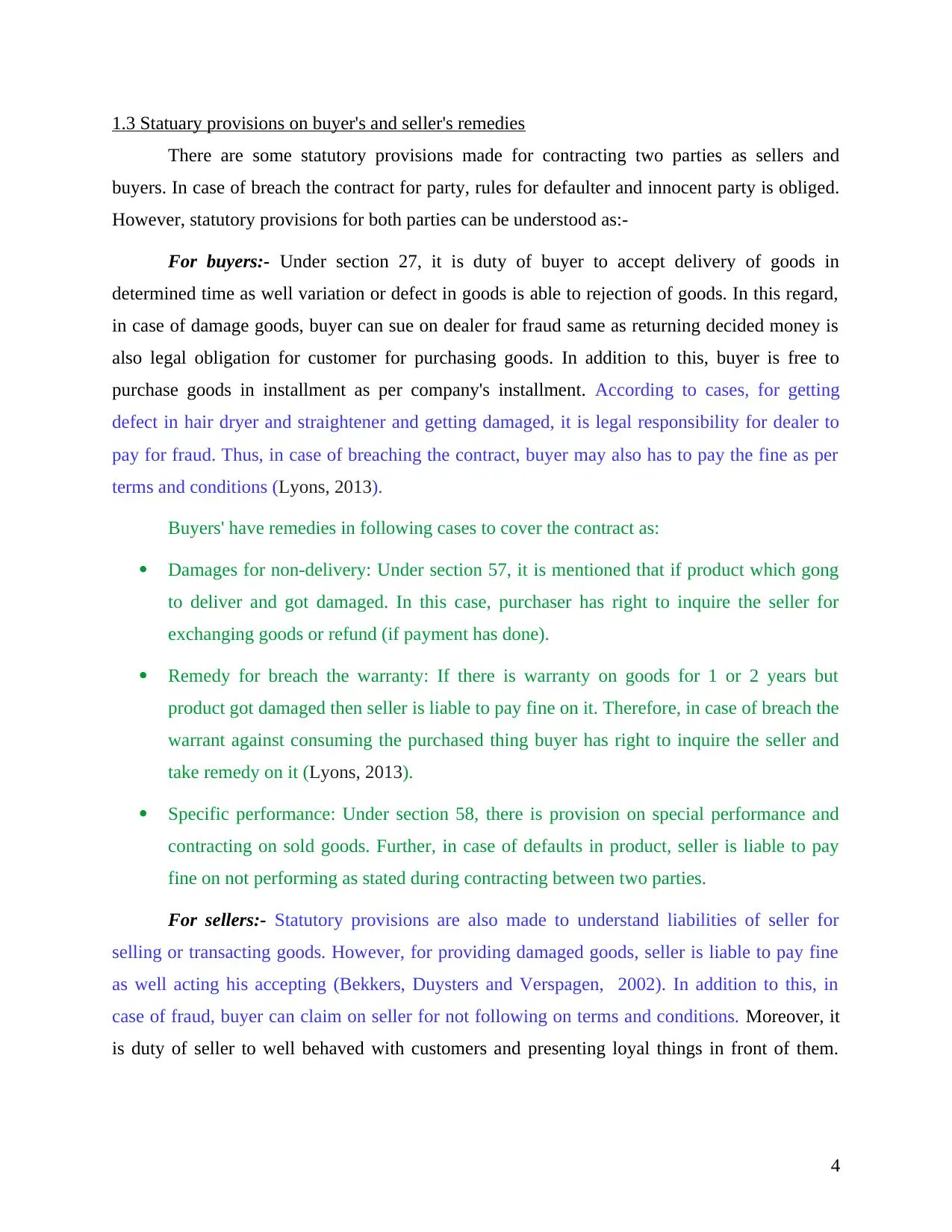
1.3 Statuary provisions on buyer's and seller's remedies
There are some statutory provisions made for contracting two parties as sellers and
buyers. In case of breach the contract for party, rules for defaulter and innocent party is obliged.
However, statutory provisions for both parties can be understood as:-
For buyers:- Under section 27, it is duty of buyer to accept delivery of goods in
determined time as well variation or defect in goods is able to rejection of goods. In this regard,
in case of damage goods, buyer can sue on dealer for fraud same as returning decided money is
also legal obligation for customer for purchasing goods. In addition to this, buyer is free to
purchase goods in installment as per company's installment. According to cases, for getting
defect in hair dryer and straightener and getting damaged, it is legal responsibility for dealer to
pay for fraud. Thus, in case of breaching the contract, buyer may also has to pay the fine as per
terms and conditions (Lyons, 2013).
Buyers' have remedies in following cases to cover the contract as:
Damages for non-delivery: Under section 57, it is mentioned that if product which gong
to deliver and got damaged. In this case, purchaser has right to inquire the seller for
exchanging goods or refund (if payment has done).
Remedy for breach the warranty: If there is warranty on goods for 1 or 2 years but
product got damaged then seller is liable to pay fine on it. Therefore, in case of breach the
warrant against consuming the purchased thing buyer has right to inquire the seller and
take remedy on it (Lyons, 2013).
Specific performance: Under section 58, there is provision on special performance and
contracting on sold goods. Further, in case of defaults in product, seller is liable to pay
fine on not performing as stated during contracting between two parties.
For sellers:- Statutory provisions are also made to understand liabilities of seller for
selling or transacting goods. However, for providing damaged goods, seller is liable to pay fine
as well acting his accepting (Bekkers, Duysters and Verspagen, 2002). In addition to this, in
case of fraud, buyer can claim on seller for not following on terms and conditions. Moreover, it
is duty of seller to well behaved with customers and presenting loyal things in front of them.
4
There are some statutory provisions made for contracting two parties as sellers and
buyers. In case of breach the contract for party, rules for defaulter and innocent party is obliged.
However, statutory provisions for both parties can be understood as:-
For buyers:- Under section 27, it is duty of buyer to accept delivery of goods in
determined time as well variation or defect in goods is able to rejection of goods. In this regard,
in case of damage goods, buyer can sue on dealer for fraud same as returning decided money is
also legal obligation for customer for purchasing goods. In addition to this, buyer is free to
purchase goods in installment as per company's installment. According to cases, for getting
defect in hair dryer and straightener and getting damaged, it is legal responsibility for dealer to
pay for fraud. Thus, in case of breaching the contract, buyer may also has to pay the fine as per
terms and conditions (Lyons, 2013).
Buyers' have remedies in following cases to cover the contract as:
Damages for non-delivery: Under section 57, it is mentioned that if product which gong
to deliver and got damaged. In this case, purchaser has right to inquire the seller for
exchanging goods or refund (if payment has done).
Remedy for breach the warranty: If there is warranty on goods for 1 or 2 years but
product got damaged then seller is liable to pay fine on it. Therefore, in case of breach the
warrant against consuming the purchased thing buyer has right to inquire the seller and
take remedy on it (Lyons, 2013).
Specific performance: Under section 58, there is provision on special performance and
contracting on sold goods. Further, in case of defaults in product, seller is liable to pay
fine on not performing as stated during contracting between two parties.
For sellers:- Statutory provisions are also made to understand liabilities of seller for
selling or transacting goods. However, for providing damaged goods, seller is liable to pay fine
as well acting his accepting (Bekkers, Duysters and Verspagen, 2002). In addition to this, in
case of fraud, buyer can claim on seller for not following on terms and conditions. Moreover, it
is duty of seller to well behaved with customers and presenting loyal things in front of them.
4
⊘ This is a preview!⊘
Do you want full access?
Subscribe today to unlock all pages.

Trusted by 1+ million students worldwide
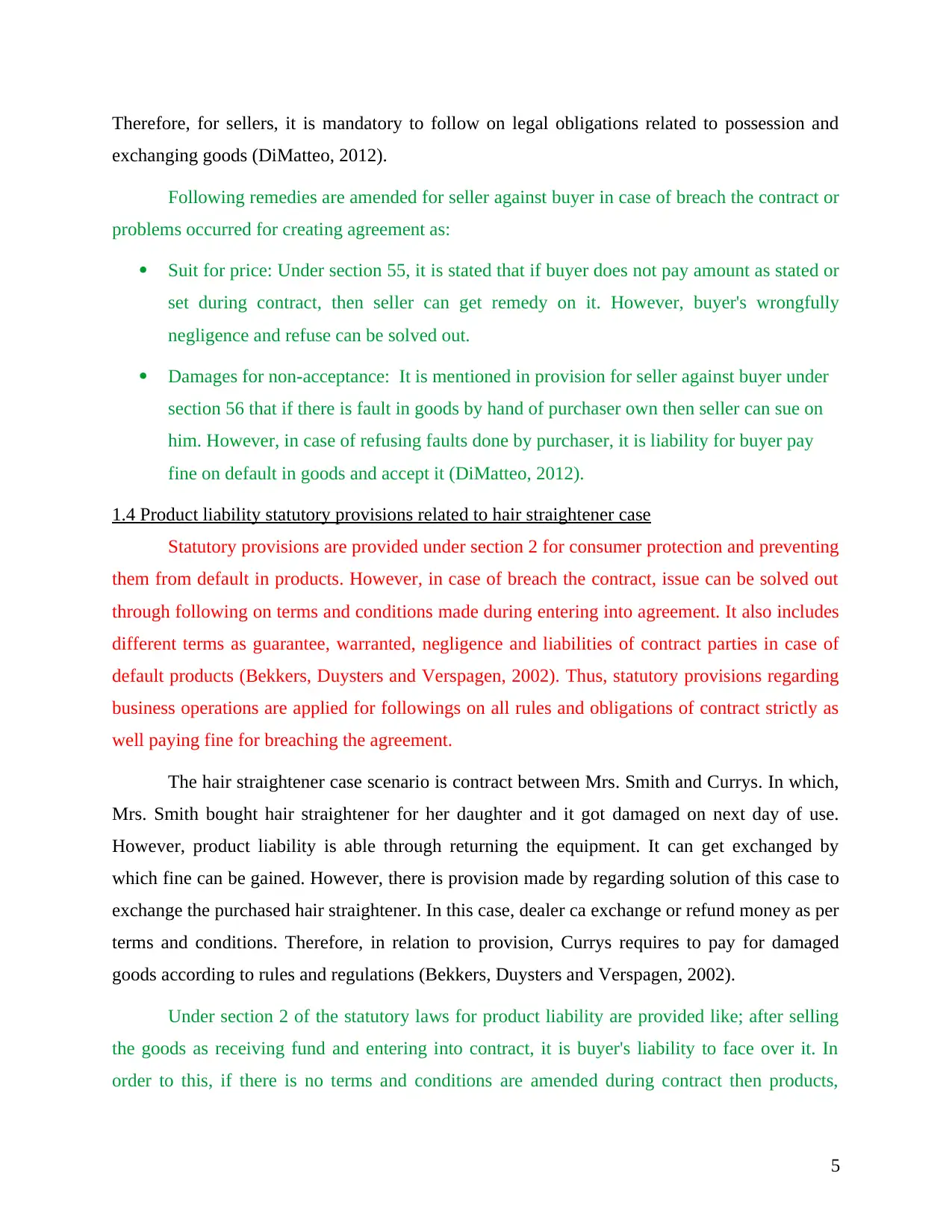
Therefore, for sellers, it is mandatory to follow on legal obligations related to possession and
exchanging goods (DiMatteo, 2012).
Following remedies are amended for seller against buyer in case of breach the contract or
problems occurred for creating agreement as:
Suit for price: Under section 55, it is stated that if buyer does not pay amount as stated or
set during contract, then seller can get remedy on it. However, buyer's wrongfully
negligence and refuse can be solved out.
Damages for non-acceptance: It is mentioned in provision for seller against buyer under
section 56 that if there is fault in goods by hand of purchaser own then seller can sue on
him. However, in case of refusing faults done by purchaser, it is liability for buyer pay
fine on default in goods and accept it (DiMatteo, 2012).
1.4 Product liability statutory provisions related to hair straightener case
Statutory provisions are provided under section 2 for consumer protection and preventing
them from default in products. However, in case of breach the contract, issue can be solved out
through following on terms and conditions made during entering into agreement. It also includes
different terms as guarantee, warranted, negligence and liabilities of contract parties in case of
default products (Bekkers, Duysters and Verspagen, 2002). Thus, statutory provisions regarding
business operations are applied for followings on all rules and obligations of contract strictly as
well paying fine for breaching the agreement.
The hair straightener case scenario is contract between Mrs. Smith and Currys. In which,
Mrs. Smith bought hair straightener for her daughter and it got damaged on next day of use.
However, product liability is able through returning the equipment. It can get exchanged by
which fine can be gained. However, there is provision made by regarding solution of this case to
exchange the purchased hair straightener. In this case, dealer ca exchange or refund money as per
terms and conditions. Therefore, in relation to provision, Currys requires to pay for damaged
goods according to rules and regulations (Bekkers, Duysters and Verspagen, 2002).
Under section 2 of the statutory laws for product liability are provided like; after selling
the goods as receiving fund and entering into contract, it is buyer's liability to face over it. In
order to this, if there is no terms and conditions are amended during contract then products,
5
exchanging goods (DiMatteo, 2012).
Following remedies are amended for seller against buyer in case of breach the contract or
problems occurred for creating agreement as:
Suit for price: Under section 55, it is stated that if buyer does not pay amount as stated or
set during contract, then seller can get remedy on it. However, buyer's wrongfully
negligence and refuse can be solved out.
Damages for non-acceptance: It is mentioned in provision for seller against buyer under
section 56 that if there is fault in goods by hand of purchaser own then seller can sue on
him. However, in case of refusing faults done by purchaser, it is liability for buyer pay
fine on default in goods and accept it (DiMatteo, 2012).
1.4 Product liability statutory provisions related to hair straightener case
Statutory provisions are provided under section 2 for consumer protection and preventing
them from default in products. However, in case of breach the contract, issue can be solved out
through following on terms and conditions made during entering into agreement. It also includes
different terms as guarantee, warranted, negligence and liabilities of contract parties in case of
default products (Bekkers, Duysters and Verspagen, 2002). Thus, statutory provisions regarding
business operations are applied for followings on all rules and obligations of contract strictly as
well paying fine for breaching the agreement.
The hair straightener case scenario is contract between Mrs. Smith and Currys. In which,
Mrs. Smith bought hair straightener for her daughter and it got damaged on next day of use.
However, product liability is able through returning the equipment. It can get exchanged by
which fine can be gained. However, there is provision made by regarding solution of this case to
exchange the purchased hair straightener. In this case, dealer ca exchange or refund money as per
terms and conditions. Therefore, in relation to provision, Currys requires to pay for damaged
goods according to rules and regulations (Bekkers, Duysters and Verspagen, 2002).
Under section 2 of the statutory laws for product liability are provided like; after selling
the goods as receiving fund and entering into contract, it is buyer's liability to face over it. In
order to this, if there is no terms and conditions are amended during contract then products,
5
Paraphrase This Document
Need a fresh take? Get an instant paraphrase of this document with our AI Paraphraser
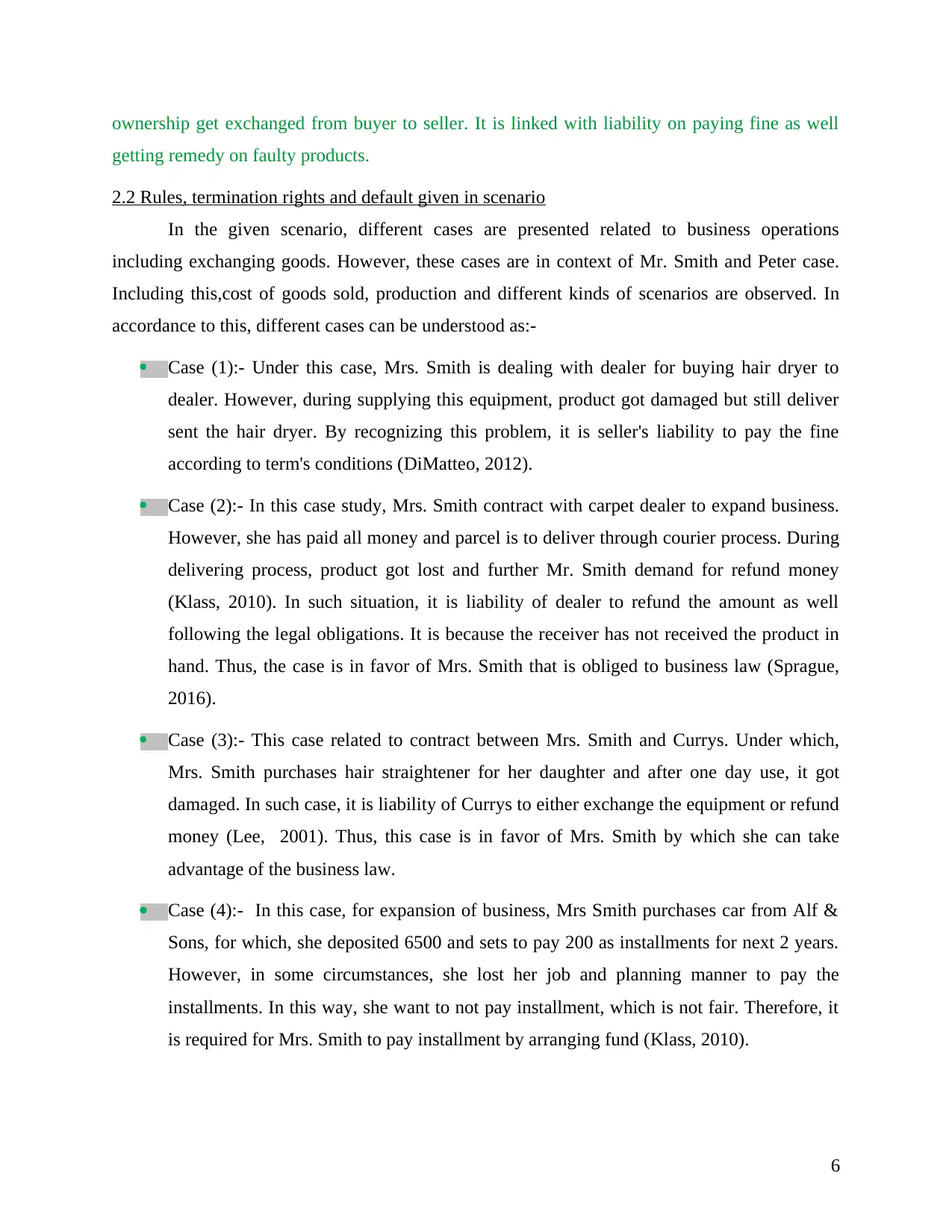
ownership get exchanged from buyer to seller. It is linked with liability on paying fine as well
getting remedy on faulty products.
2.2 Rules, termination rights and default given in scenario
In the given scenario, different cases are presented related to business operations
including exchanging goods. However, these cases are in context of Mr. Smith and Peter case.
Including this,cost of goods sold, production and different kinds of scenarios are observed. In
accordance to this, different cases can be understood as:-
Case (1):- Under this case, Mrs. Smith is dealing with dealer for buying hair dryer to
dealer. However, during supplying this equipment, product got damaged but still deliver
sent the hair dryer. By recognizing this problem, it is seller's liability to pay the fine
according to term's conditions (DiMatteo, 2012).
Case (2):- In this case study, Mrs. Smith contract with carpet dealer to expand business.
However, she has paid all money and parcel is to deliver through courier process. During
delivering process, product got lost and further Mr. Smith demand for refund money
(Klass, 2010). In such situation, it is liability of dealer to refund the amount as well
following the legal obligations. It is because the receiver has not received the product in
hand. Thus, the case is in favor of Mrs. Smith that is obliged to business law (Sprague,
2016).
Case (3):- This case related to contract between Mrs. Smith and Currys. Under which,
Mrs. Smith purchases hair straightener for her daughter and after one day use, it got
damaged. In such case, it is liability of Currys to either exchange the equipment or refund
money (Lee, 2001). Thus, this case is in favor of Mrs. Smith by which she can take
advantage of the business law.
Case (4):- In this case, for expansion of business, Mrs Smith purchases car from Alf &
Sons, for which, she deposited 6500 and sets to pay 200 as installments for next 2 years.
However, in some circumstances, she lost her job and planning manner to pay the
installments. In this way, she want to not pay installment, which is not fair. Therefore, it
is required for Mrs. Smith to pay installment by arranging fund (Klass, 2010).
6
getting remedy on faulty products.
2.2 Rules, termination rights and default given in scenario
In the given scenario, different cases are presented related to business operations
including exchanging goods. However, these cases are in context of Mr. Smith and Peter case.
Including this,cost of goods sold, production and different kinds of scenarios are observed. In
accordance to this, different cases can be understood as:-
Case (1):- Under this case, Mrs. Smith is dealing with dealer for buying hair dryer to
dealer. However, during supplying this equipment, product got damaged but still deliver
sent the hair dryer. By recognizing this problem, it is seller's liability to pay the fine
according to term's conditions (DiMatteo, 2012).
Case (2):- In this case study, Mrs. Smith contract with carpet dealer to expand business.
However, she has paid all money and parcel is to deliver through courier process. During
delivering process, product got lost and further Mr. Smith demand for refund money
(Klass, 2010). In such situation, it is liability of dealer to refund the amount as well
following the legal obligations. It is because the receiver has not received the product in
hand. Thus, the case is in favor of Mrs. Smith that is obliged to business law (Sprague,
2016).
Case (3):- This case related to contract between Mrs. Smith and Currys. Under which,
Mrs. Smith purchases hair straightener for her daughter and after one day use, it got
damaged. In such case, it is liability of Currys to either exchange the equipment or refund
money (Lee, 2001). Thus, this case is in favor of Mrs. Smith by which she can take
advantage of the business law.
Case (4):- In this case, for expansion of business, Mrs Smith purchases car from Alf &
Sons, for which, she deposited 6500 and sets to pay 200 as installments for next 2 years.
However, in some circumstances, she lost her job and planning manner to pay the
installments. In this way, she want to not pay installment, which is not fair. Therefore, it
is required for Mrs. Smith to pay installment by arranging fund (Klass, 2010).
6
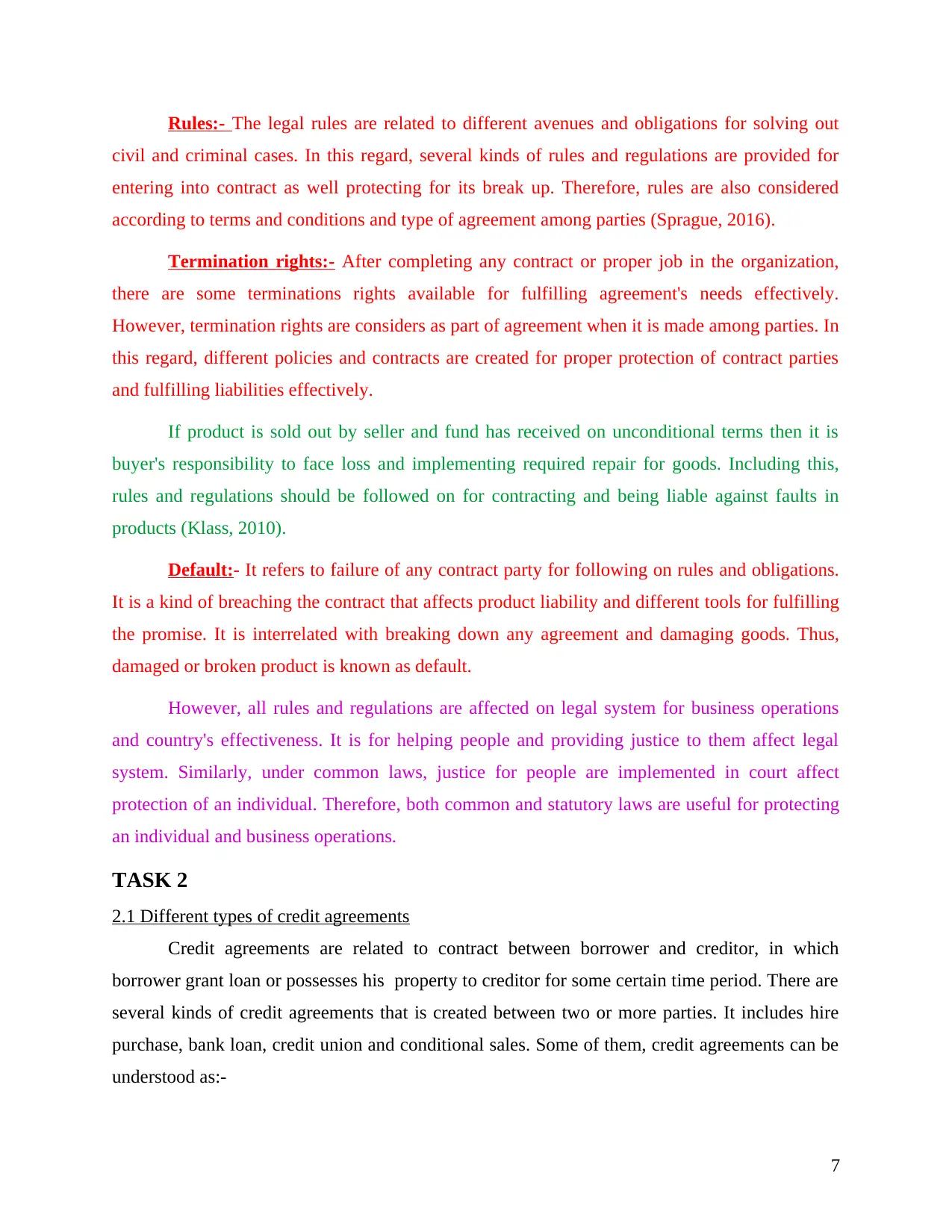
Rules:- The legal rules are related to different avenues and obligations for solving out
civil and criminal cases. In this regard, several kinds of rules and regulations are provided for
entering into contract as well protecting for its break up. Therefore, rules are also considered
according to terms and conditions and type of agreement among parties (Sprague, 2016).
Termination rights:- After completing any contract or proper job in the organization,
there are some terminations rights available for fulfilling agreement's needs effectively.
However, termination rights are considers as part of agreement when it is made among parties. In
this regard, different policies and contracts are created for proper protection of contract parties
and fulfilling liabilities effectively.
If product is sold out by seller and fund has received on unconditional terms then it is
buyer's responsibility to face loss and implementing required repair for goods. Including this,
rules and regulations should be followed on for contracting and being liable against faults in
products (Klass, 2010).
Default:- It refers to failure of any contract party for following on rules and obligations.
It is a kind of breaching the contract that affects product liability and different tools for fulfilling
the promise. It is interrelated with breaking down any agreement and damaging goods. Thus,
damaged or broken product is known as default.
However, all rules and regulations are affected on legal system for business operations
and country's effectiveness. It is for helping people and providing justice to them affect legal
system. Similarly, under common laws, justice for people are implemented in court affect
protection of an individual. Therefore, both common and statutory laws are useful for protecting
an individual and business operations.
TASK 2
2.1 Different types of credit agreements
Credit agreements are related to contract between borrower and creditor, in which
borrower grant loan or possesses his property to creditor for some certain time period. There are
several kinds of credit agreements that is created between two or more parties. It includes hire
purchase, bank loan, credit union and conditional sales. Some of them, credit agreements can be
understood as:-
7
civil and criminal cases. In this regard, several kinds of rules and regulations are provided for
entering into contract as well protecting for its break up. Therefore, rules are also considered
according to terms and conditions and type of agreement among parties (Sprague, 2016).
Termination rights:- After completing any contract or proper job in the organization,
there are some terminations rights available for fulfilling agreement's needs effectively.
However, termination rights are considers as part of agreement when it is made among parties. In
this regard, different policies and contracts are created for proper protection of contract parties
and fulfilling liabilities effectively.
If product is sold out by seller and fund has received on unconditional terms then it is
buyer's responsibility to face loss and implementing required repair for goods. Including this,
rules and regulations should be followed on for contracting and being liable against faults in
products (Klass, 2010).
Default:- It refers to failure of any contract party for following on rules and obligations.
It is a kind of breaching the contract that affects product liability and different tools for fulfilling
the promise. It is interrelated with breaking down any agreement and damaging goods. Thus,
damaged or broken product is known as default.
However, all rules and regulations are affected on legal system for business operations
and country's effectiveness. It is for helping people and providing justice to them affect legal
system. Similarly, under common laws, justice for people are implemented in court affect
protection of an individual. Therefore, both common and statutory laws are useful for protecting
an individual and business operations.
TASK 2
2.1 Different types of credit agreements
Credit agreements are related to contract between borrower and creditor, in which
borrower grant loan or possesses his property to creditor for some certain time period. There are
several kinds of credit agreements that is created between two or more parties. It includes hire
purchase, bank loan, credit union and conditional sales. Some of them, credit agreements can be
understood as:-
7
⊘ This is a preview!⊘
Do you want full access?
Subscribe today to unlock all pages.

Trusted by 1+ million students worldwide
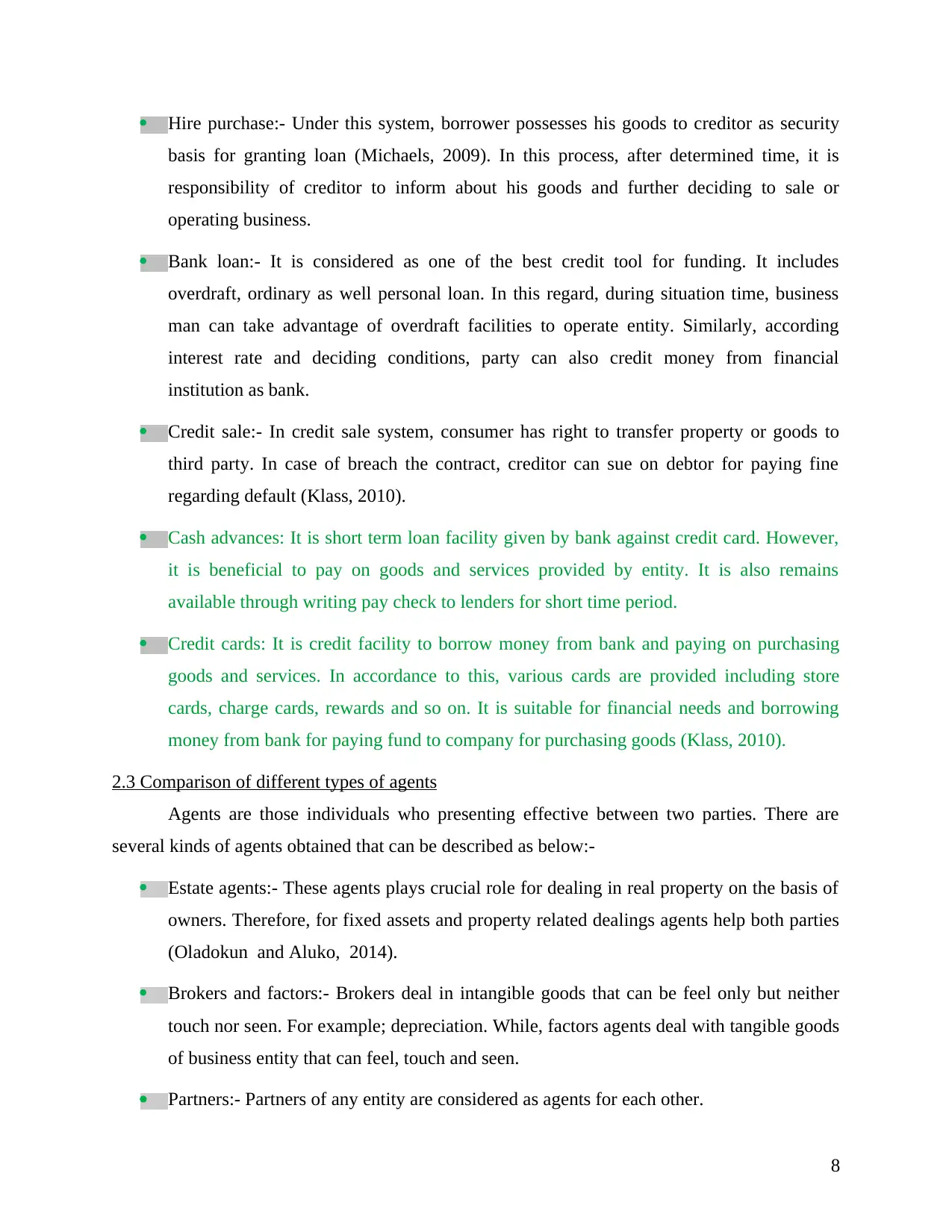
Hire purchase:- Under this system, borrower possesses his goods to creditor as security
basis for granting loan (Michaels, 2009). In this process, after determined time, it is
responsibility of creditor to inform about his goods and further deciding to sale or
operating business.
Bank loan:- It is considered as one of the best credit tool for funding. It includes
overdraft, ordinary as well personal loan. In this regard, during situation time, business
man can take advantage of overdraft facilities to operate entity. Similarly, according
interest rate and deciding conditions, party can also credit money from financial
institution as bank.
Credit sale:- In credit sale system, consumer has right to transfer property or goods to
third party. In case of breach the contract, creditor can sue on debtor for paying fine
regarding default (Klass, 2010).
Cash advances: It is short term loan facility given by bank against credit card. However,
it is beneficial to pay on goods and services provided by entity. It is also remains
available through writing pay check to lenders for short time period.
Credit cards: It is credit facility to borrow money from bank and paying on purchasing
goods and services. In accordance to this, various cards are provided including store
cards, charge cards, rewards and so on. It is suitable for financial needs and borrowing
money from bank for paying fund to company for purchasing goods (Klass, 2010).
2.3 Comparison of different types of agents
Agents are those individuals who presenting effective between two parties. There are
several kinds of agents obtained that can be described as below:-
Estate agents:- These agents plays crucial role for dealing in real property on the basis of
owners. Therefore, for fixed assets and property related dealings agents help both parties
(Oladokun and Aluko, 2014).
Brokers and factors:- Brokers deal in intangible goods that can be feel only but neither
touch nor seen. For example; depreciation. While, factors agents deal with tangible goods
of business entity that can feel, touch and seen.
Partners:- Partners of any entity are considered as agents for each other.
8
basis for granting loan (Michaels, 2009). In this process, after determined time, it is
responsibility of creditor to inform about his goods and further deciding to sale or
operating business.
Bank loan:- It is considered as one of the best credit tool for funding. It includes
overdraft, ordinary as well personal loan. In this regard, during situation time, business
man can take advantage of overdraft facilities to operate entity. Similarly, according
interest rate and deciding conditions, party can also credit money from financial
institution as bank.
Credit sale:- In credit sale system, consumer has right to transfer property or goods to
third party. In case of breach the contract, creditor can sue on debtor for paying fine
regarding default (Klass, 2010).
Cash advances: It is short term loan facility given by bank against credit card. However,
it is beneficial to pay on goods and services provided by entity. It is also remains
available through writing pay check to lenders for short time period.
Credit cards: It is credit facility to borrow money from bank and paying on purchasing
goods and services. In accordance to this, various cards are provided including store
cards, charge cards, rewards and so on. It is suitable for financial needs and borrowing
money from bank for paying fund to company for purchasing goods (Klass, 2010).
2.3 Comparison of different types of agents
Agents are those individuals who presenting effective between two parties. There are
several kinds of agents obtained that can be described as below:-
Estate agents:- These agents plays crucial role for dealing in real property on the basis of
owners. Therefore, for fixed assets and property related dealings agents help both parties
(Oladokun and Aluko, 2014).
Brokers and factors:- Brokers deal in intangible goods that can be feel only but neither
touch nor seen. For example; depreciation. While, factors agents deal with tangible goods
of business entity that can feel, touch and seen.
Partners:- Partners of any entity are considered as agents for each other.
8
Paraphrase This Document
Need a fresh take? Get an instant paraphrase of this document with our AI Paraphraser
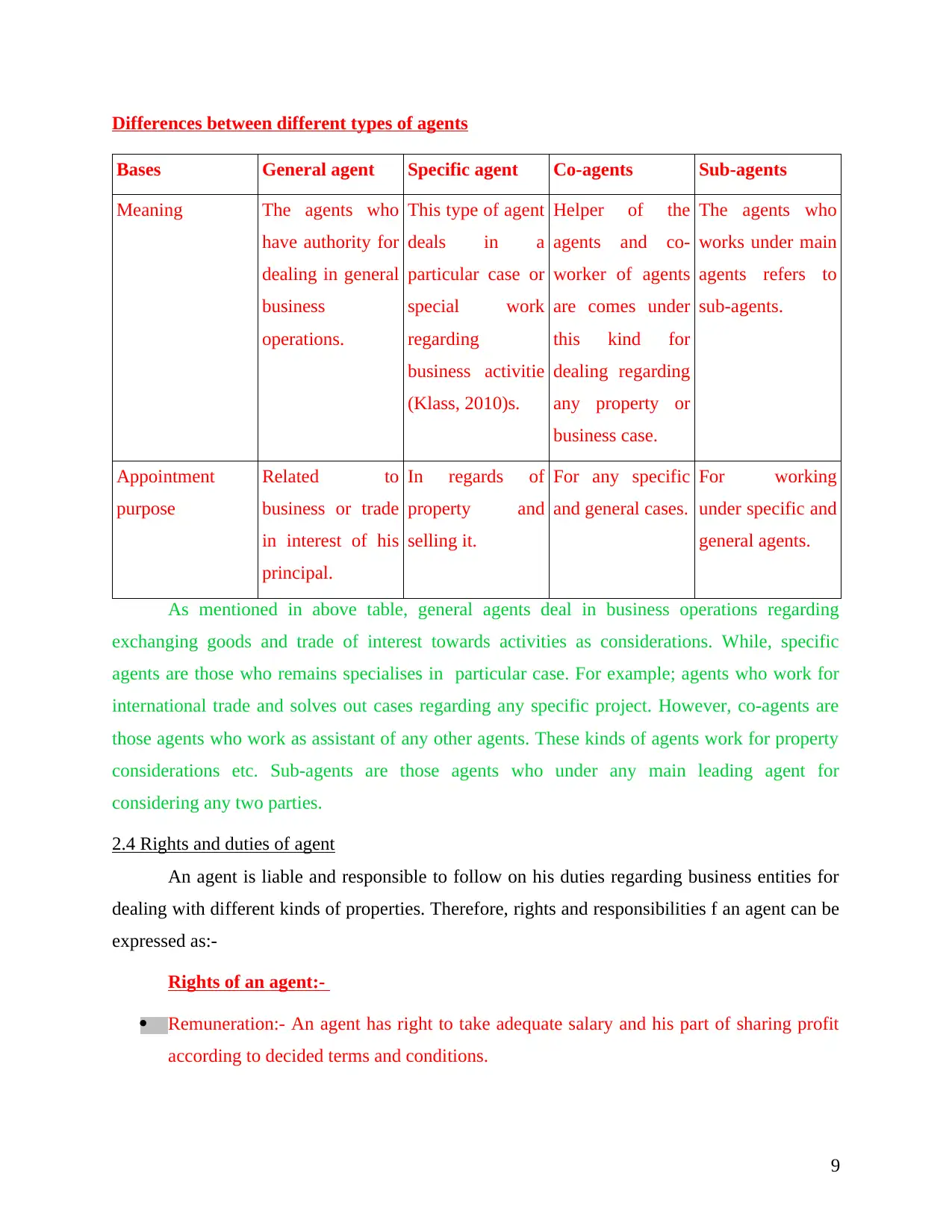
Differences between different types of agents
Bases General agent Specific agent Co-agents Sub-agents
Meaning The agents who
have authority for
dealing in general
business
operations.
This type of agent
deals in a
particular case or
special work
regarding
business activitie
(Klass, 2010)s.
Helper of the
agents and co-
worker of agents
are comes under
this kind for
dealing regarding
any property or
business case.
The agents who
works under main
agents refers to
sub-agents.
Appointment
purpose
Related to
business or trade
in interest of his
principal.
In regards of
property and
selling it.
For any specific
and general cases.
For working
under specific and
general agents.
As mentioned in above table, general agents deal in business operations regarding
exchanging goods and trade of interest towards activities as considerations. While, specific
agents are those who remains specialises in particular case. For example; agents who work for
international trade and solves out cases regarding any specific project. However, co-agents are
those agents who work as assistant of any other agents. These kinds of agents work for property
considerations etc. Sub-agents are those agents who under any main leading agent for
considering any two parties.
2.4 Rights and duties of agent
An agent is liable and responsible to follow on his duties regarding business entities for
dealing with different kinds of properties. Therefore, rights and responsibilities f an agent can be
expressed as:-
Rights of an agent:-
Remuneration:- An agent has right to take adequate salary and his part of sharing profit
according to decided terms and conditions.
9
Bases General agent Specific agent Co-agents Sub-agents
Meaning The agents who
have authority for
dealing in general
business
operations.
This type of agent
deals in a
particular case or
special work
regarding
business activitie
(Klass, 2010)s.
Helper of the
agents and co-
worker of agents
are comes under
this kind for
dealing regarding
any property or
business case.
The agents who
works under main
agents refers to
sub-agents.
Appointment
purpose
Related to
business or trade
in interest of his
principal.
In regards of
property and
selling it.
For any specific
and general cases.
For working
under specific and
general agents.
As mentioned in above table, general agents deal in business operations regarding
exchanging goods and trade of interest towards activities as considerations. While, specific
agents are those who remains specialises in particular case. For example; agents who work for
international trade and solves out cases regarding any specific project. However, co-agents are
those agents who work as assistant of any other agents. These kinds of agents work for property
considerations etc. Sub-agents are those agents who under any main leading agent for
considering any two parties.
2.4 Rights and duties of agent
An agent is liable and responsible to follow on his duties regarding business entities for
dealing with different kinds of properties. Therefore, rights and responsibilities f an agent can be
expressed as:-
Rights of an agent:-
Remuneration:- An agent has right to take adequate salary and his part of sharing profit
according to decided terms and conditions.
9
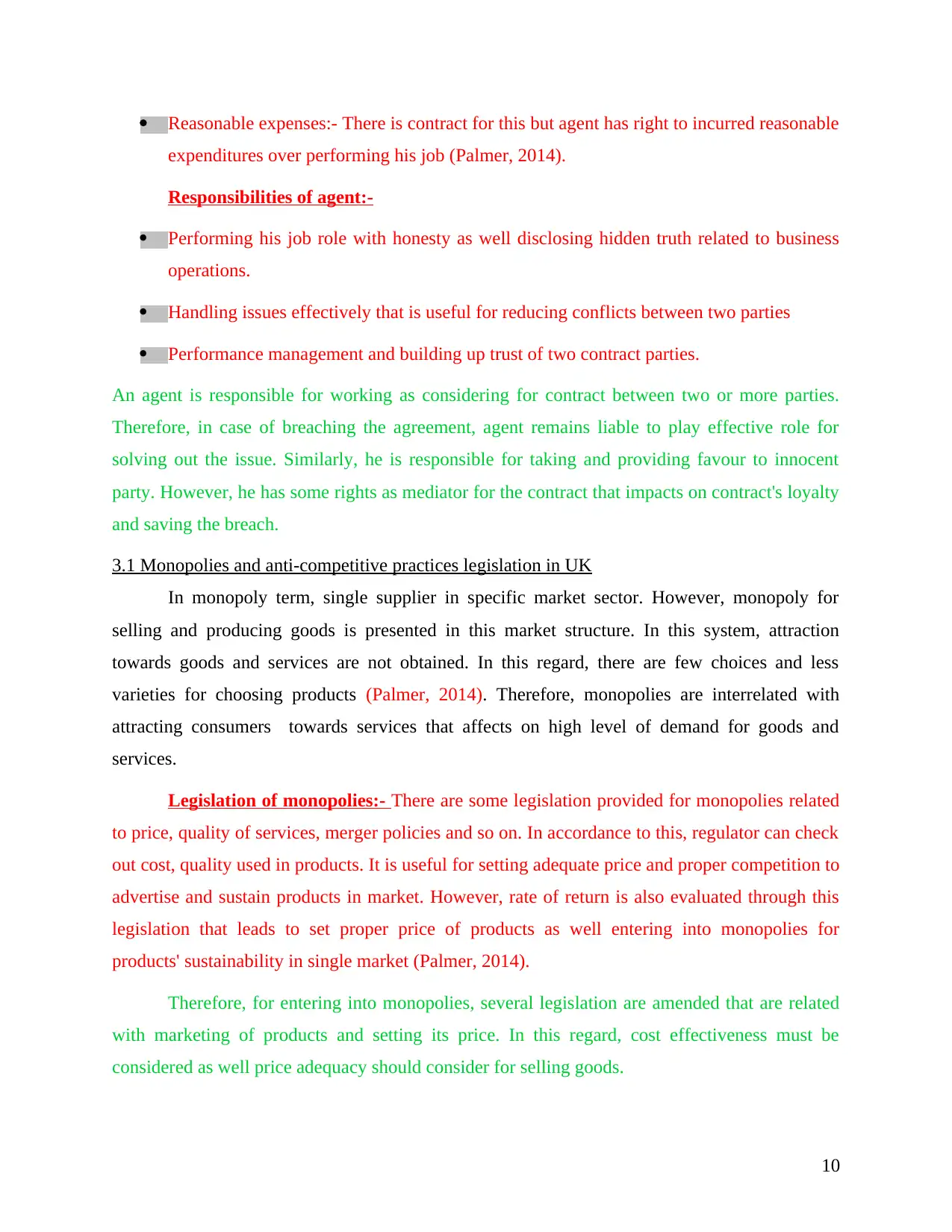
Reasonable expenses:- There is contract for this but agent has right to incurred reasonable
expenditures over performing his job (Palmer, 2014).
Responsibilities of agent:-
Performing his job role with honesty as well disclosing hidden truth related to business
operations.
Handling issues effectively that is useful for reducing conflicts between two parties
Performance management and building up trust of two contract parties.
An agent is responsible for working as considering for contract between two or more parties.
Therefore, in case of breaching the agreement, agent remains liable to play effective role for
solving out the issue. Similarly, he is responsible for taking and providing favour to innocent
party. However, he has some rights as mediator for the contract that impacts on contract's loyalty
and saving the breach.
3.1 Monopolies and anti-competitive practices legislation in UK
In monopoly term, single supplier in specific market sector. However, monopoly for
selling and producing goods is presented in this market structure. In this system, attraction
towards goods and services are not obtained. In this regard, there are few choices and less
varieties for choosing products (Palmer, 2014). Therefore, monopolies are interrelated with
attracting consumers towards services that affects on high level of demand for goods and
services.
Legislation of monopolies:- There are some legislation provided for monopolies related
to price, quality of services, merger policies and so on. In accordance to this, regulator can check
out cost, quality used in products. It is useful for setting adequate price and proper competition to
advertise and sustain products in market. However, rate of return is also evaluated through this
legislation that leads to set proper price of products as well entering into monopolies for
products' sustainability in single market (Palmer, 2014).
Therefore, for entering into monopolies, several legislation are amended that are related
with marketing of products and setting its price. In this regard, cost effectiveness must be
considered as well price adequacy should consider for selling goods.
10
expenditures over performing his job (Palmer, 2014).
Responsibilities of agent:-
Performing his job role with honesty as well disclosing hidden truth related to business
operations.
Handling issues effectively that is useful for reducing conflicts between two parties
Performance management and building up trust of two contract parties.
An agent is responsible for working as considering for contract between two or more parties.
Therefore, in case of breaching the agreement, agent remains liable to play effective role for
solving out the issue. Similarly, he is responsible for taking and providing favour to innocent
party. However, he has some rights as mediator for the contract that impacts on contract's loyalty
and saving the breach.
3.1 Monopolies and anti-competitive practices legislation in UK
In monopoly term, single supplier in specific market sector. However, monopoly for
selling and producing goods is presented in this market structure. In this system, attraction
towards goods and services are not obtained. In this regard, there are few choices and less
varieties for choosing products (Palmer, 2014). Therefore, monopolies are interrelated with
attracting consumers towards services that affects on high level of demand for goods and
services.
Legislation of monopolies:- There are some legislation provided for monopolies related
to price, quality of services, merger policies and so on. In accordance to this, regulator can check
out cost, quality used in products. It is useful for setting adequate price and proper competition to
advertise and sustain products in market. However, rate of return is also evaluated through this
legislation that leads to set proper price of products as well entering into monopolies for
products' sustainability in single market (Palmer, 2014).
Therefore, for entering into monopolies, several legislation are amended that are related
with marketing of products and setting its price. In this regard, cost effectiveness must be
considered as well price adequacy should consider for selling goods.
10
⊘ This is a preview!⊘
Do you want full access?
Subscribe today to unlock all pages.

Trusted by 1+ million students worldwide
1 out of 21
Related Documents
Your All-in-One AI-Powered Toolkit for Academic Success.
+13062052269
info@desklib.com
Available 24*7 on WhatsApp / Email
![[object Object]](/_next/static/media/star-bottom.7253800d.svg)
Unlock your academic potential
Copyright © 2020–2026 A2Z Services. All Rights Reserved. Developed and managed by ZUCOL.





